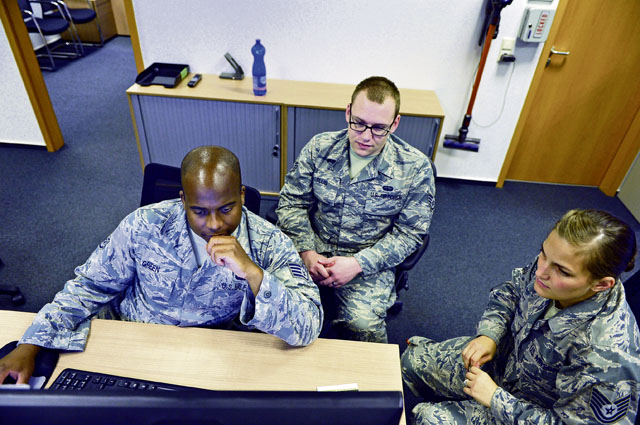
There is an epic battle raging worldwide which transcends every national boundary — and everyone is involved whether they know it or not.
It is the war in cyberspace: a realm many experts are calling the newest battlefield. This war is not fought with guns or cannons, but with technology most people carry in their pockets and keep on their desks.
“Cyber security is a family affair,” said Lt. Col. Becky Russo, 691st Cyberspace Operations Squadron commander. “A two-year-old kid nowadays can navigate an electronic device like anybody else. Teaching them the disciplines of cyber vigilance could save your family from compromising your security at a moment’s notice.”
Ahead of Cyber Awareness Month, cyber operations experts from the 691st COS discussed various methods to stay ahead of the adversary in the vast expanse of the digital world.
The 691st COS is a major cyberspace focal point in the U.S. Air Forces in Europe-Air Forces Africa major command. It delivers globally integrated cyberspace capabilities across various theaters of war and safeguards the security of Air Force assets around the world.
“We live in a digital world,” said Master Sgt. Bobby Nooner, 691st COS Weapons and Tactics Flight chief. “If you don’t own your digital life, then somebody else will. It’s very easy for the adversary to steal your information and do whatever they want with your life.”
Nooner listed a variety of tactics cyber criminals use to trap internet users and exploit them. One is a scam in which a perpetrator impersonates the email or social media account of a user’s friend or colleague and entices them to open a link or click an attachment.
Nooner also compared a cyber-attack to a spreading virus, saying the effects can spread within a network or organization.
“In the cyber world, anyone can be the weakest link,” he said. “As soon as the threat attacks one target, it’s in the chain.”
A simple phone call to a friend or colleague to confirm uncharacteristic messages can save a person from plenty of negative consequences, Nooner added.
Other cyber scams include phishing attacks, which are fraudulent emails purporting to come from reputable companies or organizations, and planting of malware into downloadable programs disguised as legitimate software.
Capt. Chad Speer, 691st COS Cyberspace Integrations Flight commander, said vigilance on the worldwide web does not end at home or the workplace, but extends to public Wi-Fi networks. Malicious entities can intercept unsecured connections and cause damage to networks or steal information, he warned.
“Make sure you use a virtual private network when you connect to public Wi-Fi,” Speer said. “These are available from legitimate sources for your computer or handheld device. VPNs are very useful in protecting you when you surf the web on public networks.”
While the variety of traps and pitfalls in the digital world seem to be endless, so are the ways web users can defend themselves, said Capt. Gregory Huete, 691st COS Cyberspace Protection Flight commander.
Huete listed the consequences of falling victim to a cyber-crime: identity theft, loss of personal and work-related property, a tarnished image, and in extreme cases danger to one’s life. People can save themselves a lot of trouble by exercising basic discipline and caution in every facet of their lives, and should not treat the virtual world as an illusion just because they can’t physically feel it, he said.
“If you allow somebody to steal your information, they do with it as they see fit,” he said. “It lets them control the narrative, even allowing them to tell a different version of the truth. They can paint a picture of you that does not match reality. Your cyber security is important not only for yourself, but for your family and the Air Force.”


